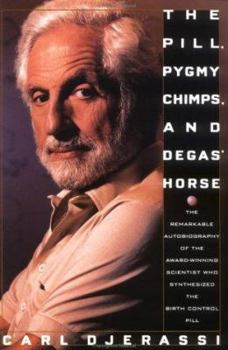The Pill, Pygmy Chimps, and Degas' Horse: The Remarkable Autobiography of the Award Winning Scientist Who Synthesized the
Select Format
Select Condition 
Book Overview
Father of the birth control pill, developer of antihistimines, founder of chemical companies, teacher of world-class chemists, best-selling novelist...as The Scientist notes, Few can match Carl... This description may be from another edition of this product.
Format:Paperback
Language:English
ISBN:0465057586
ISBN13:9780465057580
Release Date:August 1993
Publisher:Basic Books
Length:352 Pages
Weight:0.60 lbs.
Dimensions:0.7" x 4.4" x 9.0"
Customer Reviews
2 ratings
No regrets.
Published by Thriftbooks.com User , 21 years ago
Revealing autobiography of the scientist who transformed the world by synthesizing the Pill."I have no regrets that the Pill has contributed to the sexual revolution of our time and perhaps expedited it, because most of those changes in sexual mores would have happened anyway."Djerassi give us an incisive picture of his personal life. But the biggest part of this book tells the intriguing story of the synthesizing of the Pill and the problems to prove that there were only minor side-effects: a battle with the FDA. A good lesson for every scientist.He is perhaps too harsh for the environmental fundamentalist. But he remarks among other things that "... in general, life in the modern industrial world has not contributed to increased death from cancer", and that "99.9 percent of all pesticides consumed by humans are derived not from synthetics but rather from the plants themselves".Also interesting is the story of the Pugwash Conference, whose altruistic goal was corrupted by a struggle between the cold war warriors.His biggest confession "At heart, I'm still a gambler."Excellent work, not only for scientists.
Prevailing over life's circumstances
Published by Thriftbooks.com User , 23 years ago
To read from the works of Carl Djerassi is to sample the mind of a creative genius the breadth of whose life activities spans scientific research to writing fiction and plays. His autobiography is best read in the context of some of his other works. This review of his autobiography will reference two of his works of fiction, The Bourbaki Gambit, and NO. These books will never be on the best seller lists. Yet it precisely because of this that they should be read by scientists and engineers as food for thought. These books grew on me. By the time that I had finished them, I had experienced compelling plot lines. More importantly I had experienced the emotions of scientists at the beginnings and ends of their careers. Is Djerassi, at an age where many are spending their days playing golf or reliving their pasts, using science in fiction as metaphor for his own career? Is not the promise of the medical advances of the last several decades the time and the vitality to explore new horizons and to boldly embark on a new career, rather than to ride quietly into the sunset? If nothing else, these works celebrate creative solutions to how one manages one's career throughout one's life.The Bourbaki Gambit has Max Weiss, professor of chemistry at Princeton University, being forced into a retirement that he neither wants nor is prepared for. Stunned at a sudden loss of all that has been his life, Max considers others in his predicament and hatches a plan to show that retirement age does not mean the end of contributions. The plan? Nothing less than to jointly make a fabulous scientific discovery, and publish it as a sole, fictitious author. Does the plan work? Read the book. If this was all you read, you might be tempted to say that this is the swan song of an old professor, but NO takes us to the other end of the spectrum. The device for this book is the molecule nitric oxide, which is active in many physiological processes. Specifically this book is a fictionalized account of the development and commercialization of a predecessor to Viagra. urialism. In the end, both husband and wife fulfill their careers by going full circle. To better understand these works as metaphors for a scientific career, you must read Dieresis's autobiography. The rather cumbersome title, The Pill, Pygmy Chimps, and Degas' Horse, prepares the reader for what comes -- a highly readable journey through a series of defining events in his life. Question: is it better to read the fiction first, or the autobiography? Clearly this is a man the power of whose ideas transcends science or literature. Approach the autobiography as an insight into his mind. From persecution in 1930's Vienna as a teenager; to dealing with the provincial culture of the Mid West at the outset of World War II; to performing world class chemical synthesis from an isolated setting in Mexico in the early 1950's (activities which led to the synthesis of compounds that u





